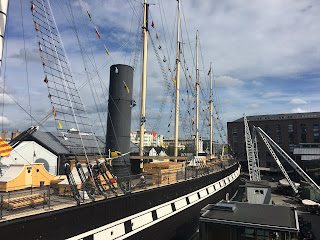Well, it's not quite like that here. But it is a time where many of us have unexpected amounts of leisure to stop, and gaze, and think. And haiku is the perfect way to encapsulate such moments, and such thoughts, in a few words.
Japanese is a very different language from English, and so English haiku is naturally going to differ from the original form. I don't know any Japanese, so I don't know how great the difference is. But this is my understanding of the form.
A haiku is very short. It has three lines, and traditionally the first and last line have five syllables each, and the middle line has a heady seven syllables. It doesn't rhyme.
It focuses on a moment in time. Because of this, transience, a sense of time passing, of the cycle of life, is often a theme. Often it will start with an observation of something observed through the senses - something seen, heard, smelled, touched or felt. This may be followed by a reflection: the experience examined. Short as it is, it can be very profound: whether it's that or not, it certainly captures a moment in time in a very direct way.
Haikus don't take very long to write, but like any creative activity, they require you to focus very intently on what you're doing. And while you're doing that, you aren't doing other things - like worrying, for instance. So they're ideal for the time of the virus.
And they're good too because they make us notice things; they help us to engage with the world outside ourselves - particularly with the natural world.
Here are a couple I did a while ago. I volunteer on the SS Great Britain, Isambard Kingdom Brunel's beautiful, groundbreaking ship. It's been brilliantly restored, and you can go to see it in Bristol.
 |
| The SS Great Britain |
One day last winter, as the afternoon drew to a close and the shadows lengthened, I was on the ship, below deck. Hardly anyone was about. At this time, the ship's past feels very close. I thought about all the people who had travelled on the ship for two months at a time, who'd lived, laughed, fought, given birth, fallen ill, died there.This is what I wrote.
The ship's restless ghosts
Whispering, sighing, sleeping.
Lives lived and lives lost.
And this one, about the ship herself:
She cleaves the water
Not mistress of the sea, but
An uneasy guest.
Over the next few weeks, I'm going to have a go at writing some about the time of the virus. Will post in the comments. If you write one and would like to share it, you could do the same!



The time of the plague.
ReplyDeleteThe world’s engine halts, falls silent.
A plum blossom opens.
Terrific!
DeleteLove it!
ReplyDeleteThe sky is empty
ReplyDeleteOf planes. Birds reclaim the space.
And oh - how they sing!
We walk in sunlight
ReplyDeleteComing down from the high ground
Home through silent streets
Love it, Eric. When you read it, you're there, in that moment.
ReplyDeleteForced idleness
ReplyDeleteGives a perfect chance to shine
And light up the dark.
Another lovely one - how like you to look for the positive!
ReplyDeleteJewel-faced goldfinches
ReplyDeleteBeautiful, dancing flashes
Here now, gone again.
Not really to do with the situation but anyway!
DeleteDoesn't matter at all - it's about things you're seeing now - and who doesn't need more goldfinches in their lives! Thanks - it's lovely.
ReplyDeleteTopsy turvy world
ReplyDeleteSocial isolation rules
Hugs and kisses banked
This is by Dianne Long - love that last line!
DeleteKitchen table desk.
ReplyDeleteCompanionable silence,
As we work from home
The new normal!
ReplyDeleteThis is a bit cynical, but sometimes how I feel-
ReplyDeleteOut at eight o'clock
Give clap to the NHS
Toilet rolls on list
Glass. Out there, trees sway
ReplyDeleteBirds dance across tides of air,
Petals float, fall. Glass.